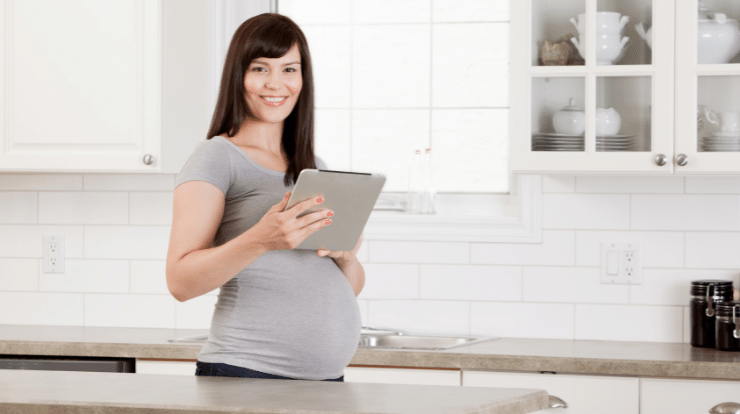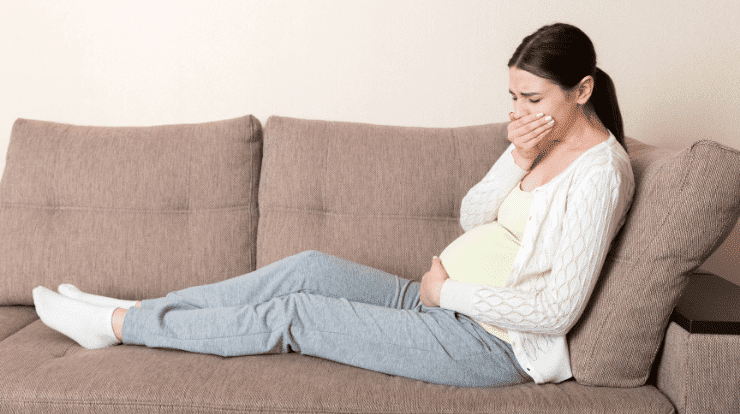
What is pelvic pain during pregnancy?
Pelvic pain during pregnancy sometimes called round ligament pain, is a common cause of lower abdominal pain. Pelvic pain during pregnancy (often called SPD or pelvic girdle pain) is similar to the pain you may have experienced with your menstrual cycle and is often described as a dull ache, pressure, or pulling in the lower abdomen. It can be painful at times and it tends to worsen when you sneeze, cough, or lift something heavy.
During pregnancy, the uterus expands to accommodate the growing fetus. As it grows, it can apply pressure to the abdominal organs, which may cause pain. Pain in the pelvis is often described as a dull ache or cramping that either comes and goes or is steady. The pain is usually felt around the pubic bone, lower back, or inner thighs. It can range in severity from mild to severe. Pelvic pain can be a normal part of pregnancy and usually improves as pregnancy progresses. Sometimes it may signal a problem such as an ectopic pregnancy or appendicitis.
Is it normal to have pelvic pain during pregnancy?
Yes, it is normal to have pelvic pain during pregnancy. In fact, pelvic pain is one of the most common complaints of pregnant women. If you have pelvic pain, the first thing you should know is that your pain is not the result of a problem with the baby or the pregnancy. In fact, your baby is probably doing just fine. Although the pain can often be severe. Some 30 to 40 percent of all pregnant women have varying degrees of pelvic pain. The pain is felt in the lower abdomen and may extend to the back.
Symptoms of pelvic pain during pregnancy:
Pregnancy is a beautiful experience and gives expectant mothers a lot to look forward to. However, pregnant women often deal with some serious discomfort from their child’s growth that may even limit their movements and cause pain in specific areas of the body.
Following are the symptoms of pelvic pain during pregnancy:
- Women may also feel back pain across one or both sides of their lower back.
- Women may feel pain in the area of their pubic bone, which is located on the front lower part around their hips.
- Women can feel pain in a part of their body known as the perineum or T-Tunnel.
- Women usually experience pain when it spreads to their thighs.

What can cause pelvic pain during pregnancy?
There are various common causes of pelvic pain during pregnancy. Cramping in the abdomen during pregnancy usually happens in the second half of your first trimester. It happens because your uterus is adjusting to support both you and the growing fetus, even though it sometimes causes mild pain.
Causes for pelvic pain during pregnancy include:
- Uterus and fetus Growth
- baby’s weight Pressure
- When your body is ready for birth, a hormone called relaxin will be released, which causes your joints and ligaments to loosen.
- pregnancy-related pelvic pain is caused by several factors including Symphysis pubis dysfunction (pubic pain)
How to relieve pelvic pain during pregnancy?
We understand how difficult it is to deal with pelvic pain and discomfort. So, here’s some recommended advice on ways that can protect your pelvic region from developing further problems – whether you’re dealing with anxiety, stress urinary incontinence.
Following are the 7 tips to relieve pelvic pain during pregnancy:
- Putting an ice pack over the pelvic area during pregnancy can relieve Pelvic Pain.
- Strengthen your pelvic floor by using pelvic physiotherapy, which is a type of physiotherapy that can help strengthen the muscles in a woman’s pelvis, stomach and back.
- Water aerobic exercise has been shown to be an effective and efficient form of exercise for women during any stage of pregnancy.
- The best way to not let pelvic pain during pregnancy interfere with your day is to use crutches, a support belt if you need one, or any equipment that will help you get around without disrupting things and making it difficult for you to focus on anything else.
- When experiencing pain in the pelvic region during pregnancy, it is important to rest as often and for as long as possible.
- To relieve pelvic pain during pregnancy, wear supportive, flat shoes Try Pregnant Shoes designed to help you cope with joint and muscle challenges during body changes
- To relieve pregnancy pain, don’t move around too much. Although it may not be noticeable immediately.
Is walking good for pelvic pain during pregnancy?
Pelvic discomfort may be caused by several issues but the most common one is pelvic joint misalignment. When this happens, your joints move unevenly, causing your pelvis itself to become unstable. This usually means that anything you are doing that causes movement like walking or sitting becomes painful which can stop you from being able to effectively and continuously exercise – an important practice when it comes to pain relief. However, physical rehabilitation exercises can really help and they should be tailored towards the specific symptoms that are impacting your body at any given time.
Can constipation cause pelvic pain during pregnancy?
During pregnancy, you may have noticed your bowel habits change. Instead of going to the bathroom every day, it might be every other day. Some women even begin to have constipation — or difficulty having a bowel movement — during pregnancy. Constipation can cause you to feel the need to have a bowel movement but be unable to have one. Constipation is a common cause of pelvic pain during pregnancy. In fact, constipation is the most common cause of painful pregnancy symptoms. When you’re constipated, hard stools and straining to have a bowel movement can cause pain in your lower back and abdomen.
When to be concerned about pelvic pain during pregnancy?
If you are wondering when to be concerned about pelvic pain during pregnancy, this article is for you. It will review the common signs and symptoms of pelvic pain and when you should seek medical attention. Pregnancy can be an exciting (and sometimes scary) time in a woman’s life. There is no need to worry about pelvic pain during pregnancy.
Most of the time, pain in this area is normal and will subside as your pregnancy progresses. It is important to understand that some pelvic pain during pregnancy is normal while other conditions can present serious risks to you or your baby.
It’s best to see a healthcare or doctor professional if:
- You experience fever, fatigue, body aches, and chills.
- Your pain is continuous and doesn’t go away when you take a rest.
- You experience dizziness and vomiting.
- The burning sensation you feel when you urinate is probably an indicator that something isn’t right.
- You have lower abdominal pain that has lasted for longer than a week.
- You may notice some stuff coming out of your vagina that is a little bit different than normal. It could come in the form of greenish, yellowish, or even pinkish discharge that can either be watery, frothy, or blood-filled.






